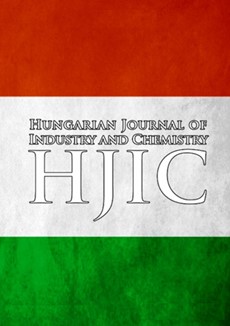Enzymatic Esterification of Lactic Acid under Microwave Conditions in Ionic Liquids
DOI:
https://doi.org/10.1515/183Abstract
Ethyl lactate is a natural flavouring compound and can be used as an environmentally friendly solvent, as well. Lactic acid production requires costly downstream processes, which increases the price of the products. One of the latest purification methods is the extraction of the lactic acid from the fermentation broth by phosphonium type ionic liquids. This method gives the possibility to synthetise lactates in the extracting agent avoiding an expensive separation process. Microwave heating is widely used in organic chemistry because it usually shortens the reaction time and enhances the reaction rate, but its effect on enzymatic esterification reactions in ionic liquid media was hardly investigated. For comparison of the ethyl lactate synthesis in different media two organic solvents and 20 ionic liquids were tested. Eight suitable media were found: toluene and 7 ionic liquids. The reaction conditions of the enzymatic synthesis were optimised in toluene and in Cyphos 104. Using toluene the highest yield (80%) was achieved in a reaction mixture consisting of 1 mmol lactic acid, 5 mmol ethanol and 4.5 w/w% initial water content diluted by organic solvent to 5 cm3. The enzyme amount needed was 250 mg. In Cyphos 104 medium 0.8 mmol ionic liquid, 2 mmol lactic acid, 7 times ethanol excess, 2 w% initial water content and 25 mg immobilised Candida antarctica lipase B was enough to carry out the reaction up to 95% yield in 24 hour on 40 °C. The obtained yields and reaction parameters were compared using the two previous media and enzyme reusability tests were done. This experiment gave the result that smaller enzyme amount is enough in ionic liquid than in toluene and the enzyme stability is also much better in it. The synthesis was studied under microwave conditions as well, and the following effects were observed: The optimal initial water content was shifted from 3.7 w/w% to 3 w/w% but the same yield was achieved. Microwave heating accelerated the hydrolysis of lactoyllactic acid providing the mixture with fresh lactic acid and enhancing the reaction rate.Downloads
Published
2008-09-01
Issue
Section
Articles
How to Cite
Enzymatic Esterification of Lactic Acid under Microwave Conditions in Ionic Liquids. (2008). Hungarian Journal of Industry and Chemistry, 36(1-2). https://doi.org/10.1515/183




